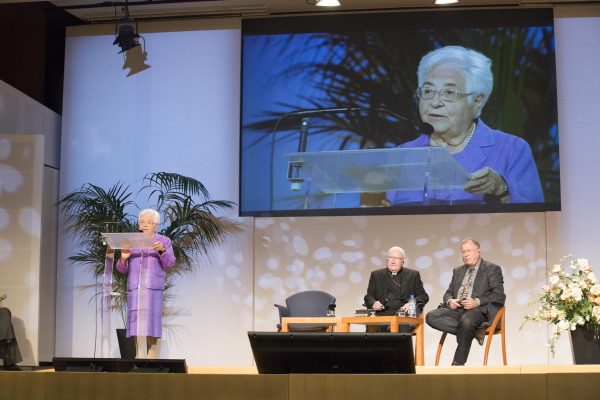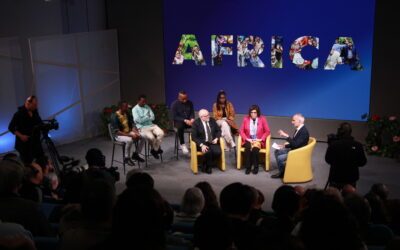 “The Revolution of the Gospel. A return to the Gospel and the Life of the Gospel in the World.” The putting into practice of the Word of God today as the early Christians did, contains therein the ecumenical journey that began 50 years ago by Chiara Lubich and taken ahead by the Focolare Movement all over the world. It is a journey in which Christians of all Churches fully partake in as seeds of peace in a world wounded by wars and divisions. Maria Voce, president of the Focolare Movement spoke about this recently. We met her at a press conference with journalists of various newspapers, at the end of the 59th Ecumenical Week, which took place at the international Mariapolis Centre in Castel Gandolfo during 11-13 May. The hall was jam packed. There were about 700 Christians belonging to 69 Churches and ecclesial communities, from 40 countries around the world. The translation booths were in full swing with 17 different language interpreters. The participants were of all ages and races, and the clothes they wore showed their different backgrounds and affiliations. A highlight of the Ecumenical Week was the recital of the prayer for unity in the Catacombs of St Sebastian in Rome, in the very place where the first Christians and martyrs used to meet. Here, they made the so-called ‘Pact of Mutual Love’ through the exchange of the sign of peace, asking forgiveness for the harm inflicted in the past and so that “renewed by love, we take this witness lived between us to our communities in our countries, and in our society”. “We have built so much together,” commented Maria Voce. “Now it is about accelerating the pace, so that communion is full and visible. We need to go forward.” The world yearns for universal brotherhood as never before. Do you think it is possible? Is it possible in this century?
“The Revolution of the Gospel. A return to the Gospel and the Life of the Gospel in the World.” The putting into practice of the Word of God today as the early Christians did, contains therein the ecumenical journey that began 50 years ago by Chiara Lubich and taken ahead by the Focolare Movement all over the world. It is a journey in which Christians of all Churches fully partake in as seeds of peace in a world wounded by wars and divisions. Maria Voce, president of the Focolare Movement spoke about this recently. We met her at a press conference with journalists of various newspapers, at the end of the 59th Ecumenical Week, which took place at the international Mariapolis Centre in Castel Gandolfo during 11-13 May. The hall was jam packed. There were about 700 Christians belonging to 69 Churches and ecclesial communities, from 40 countries around the world. The translation booths were in full swing with 17 different language interpreters. The participants were of all ages and races, and the clothes they wore showed their different backgrounds and affiliations. A highlight of the Ecumenical Week was the recital of the prayer for unity in the Catacombs of St Sebastian in Rome, in the very place where the first Christians and martyrs used to meet. Here, they made the so-called ‘Pact of Mutual Love’ through the exchange of the sign of peace, asking forgiveness for the harm inflicted in the past and so that “renewed by love, we take this witness lived between us to our communities in our countries, and in our society”. “We have built so much together,” commented Maria Voce. “Now it is about accelerating the pace, so that communion is full and visible. We need to go forward.” The world yearns for universal brotherhood as never before. Do you think it is possible? Is it possible in this century?  “I know it’s possible, though I can be sure it will happen in this century. One thing is certain that we will reach this goal, because it is God’s wish. God wants the whole human family to be a family of brothers and sisters. And if God wants it, then this plan of unity for humankind will be fulfilled. Perhaps it won’t succeed in this century. But what’s important is that that we take the steps that God asks of us today, and today God asks us to work in this direction and as Christians to at least recognize each other as brothers and sisters. In the ecumenical world, one perceives the suffering of Christians belonging to different Churches of not being able to participate in the same Eucharistic celebration. How do you respond? “It’s undoubtedly a suffering for everything. However, we believe that the presence of Jesus in the world is not limited to a Eucharistic presence. Jesus is present in the world in so many ways. He is present with his love; he is present in the people around us because we recognise Jesus in every neighbour; he is present in the poor, in those who guide us in the Church’s magisterium, and in the various Churches and institutions. We, as the Focolare Movement, feel that two things are particularly important. The first is that suffering is the presence of Jesus in the world. Jesus has taken upon himself all the sufferings of humanity, and hence the pain of division. It is a suffering that Jesus himself endured when he was crucified and abandoned. The second thing, which is of utmost importance, is contained in the words of Jesus: “Where two or more are gathered in my name …”. He did not say gathered in the Eucharist, but rather he said “in my name”. And what does it mean to be united in the name of Jesus? It means to be united in reciprocal love which he brought on earth. So where two or more are united in his name, there is his presence. This presence of Jesus in the world is in a way proof that we already live a true communion, and therefore we could also say: “Who can separate us from the love of Christ?” While it’s not possible to receive the Eucharist together, we can’t but receive the love of God, we can’t but live this love among us in the hope that one day we can arrive to that full communion which will be added to the communion that we already live.” (to be continued) Interview by M. Chiara Biagioni – Source: S.I.R See Part 2
“I know it’s possible, though I can be sure it will happen in this century. One thing is certain that we will reach this goal, because it is God’s wish. God wants the whole human family to be a family of brothers and sisters. And if God wants it, then this plan of unity for humankind will be fulfilled. Perhaps it won’t succeed in this century. But what’s important is that that we take the steps that God asks of us today, and today God asks us to work in this direction and as Christians to at least recognize each other as brothers and sisters. In the ecumenical world, one perceives the suffering of Christians belonging to different Churches of not being able to participate in the same Eucharistic celebration. How do you respond? “It’s undoubtedly a suffering for everything. However, we believe that the presence of Jesus in the world is not limited to a Eucharistic presence. Jesus is present in the world in so many ways. He is present with his love; he is present in the people around us because we recognise Jesus in every neighbour; he is present in the poor, in those who guide us in the Church’s magisterium, and in the various Churches and institutions. We, as the Focolare Movement, feel that two things are particularly important. The first is that suffering is the presence of Jesus in the world. Jesus has taken upon himself all the sufferings of humanity, and hence the pain of division. It is a suffering that Jesus himself endured when he was crucified and abandoned. The second thing, which is of utmost importance, is contained in the words of Jesus: “Where two or more are gathered in my name …”. He did not say gathered in the Eucharist, but rather he said “in my name”. And what does it mean to be united in the name of Jesus? It means to be united in reciprocal love which he brought on earth. So where two or more are united in his name, there is his presence. This presence of Jesus in the world is in a way proof that we already live a true communion, and therefore we could also say: “Who can separate us from the love of Christ?” While it’s not possible to receive the Eucharist together, we can’t but receive the love of God, we can’t but live this love among us in the hope that one day we can arrive to that full communion which will be added to the communion that we already live.” (to be continued) Interview by M. Chiara Biagioni – Source: S.I.R See Part 2
Live the present moment
Live the present moment




0 Comments